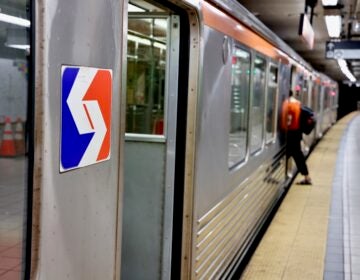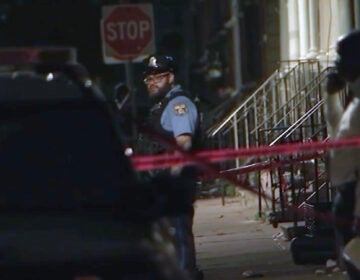A former SEPTA worker says she saw a homicide on the subway and has PTSD. She’s suing the agency and her union over her firing
Carmella Martin says SEPTA officials contended that she should go back to her previous position, despite her physician's recommendation against it.

Passengers wait at the City Hall stop on the Broad Street line. (Emma Lee/WHYY)
From Philly and the Pa. suburbs to South Jersey and Delaware, what would you like WHYY News to cover? Let us know!
A former SEPTA employee, who witnessed a homicide on the job, is suing the transit agency and her union, claiming that she was unlawfully fired for seeking time off to recover and was denied an opportunity to work in another position.
In a lawsuit filed in federal court, Carmella Martin said that she saw someone killed in the subway on April 8, 2023. The lawsuit does not go into detail about the killing, but police reported that a 21-year-old man was killed on the underground platform at SEPTA’s Walnut-Locust subway station that day.
After witnessing the homicide, Martin took time off under the Family and Medical Leave Act and collected workers’ compensation, the lawsuit states. She claims that she developed and was treated for Post-Traumatic Stress Disorder, anxiety and depression during this time.
The lawsuit states that Martin was “effectively terminated” on Nov. 9, 2023, for “expiration of sick leave.” She challenged the firing. On March 8, 2024, she was reinstated and placed on Injured on Duty leave after a favorable ruling in her workers’ compensation claim, according to the lawsuit.
Martin claims that in the following months, SEPTA ignored her physicians’ advice that she not be placed back on a subway job and that she was still disabled, and fired her again in December for exhausting her sick leave when she did not return to work.
Martin is Black. The lawsuit also claims that her firing is part of a pattern where the agency “has endeavored to preserve the employment of Caucasians over the employment of African-Americans, including in the acceptance of grievances, disputes regarding workers compensation, and the assignment of workers to various leave types.”
Martin is also suing Transport Workers Union of Philadelphia, Local 234, the union that represents SEPTA employees, claiming racial and disability discrimination. The lawsuit says that after SEPTA denied her second grievance following a hearing in April, the union denied her request to pursue it further and questioned the legitimacy of her disability.
Attorneys representing SEPTA did not respond to requests for comment, nor did a representative of Local 234.
The lawsuit claims that in April 2024, one month after SEPTA reinstated Martin’s employment on Injury on Duty status, she was required to submit to an independent medical evaluation. Martin says that the medical examiner provided by SEPTA determined she had “fully recovered” and directed her to return to work in May.
This is in opposition to what Martin’s treating physicians determined, she claims, who said that she “remained disabled and specifically could not work in the subway environment where she had witnessed the homicide.”
SEPTA representatives denied her an opportunity to move to a different position, the lawsuit claims, and refused to place her on Injured on Duty leave again following the medical examiner’s ruling.
“Rather than engaging [Martin] in an interactive dialogue regarding accommodation of her medical restrictions, SEPTA engaged in private internal discussions about her request and then denied it without notification or explanation,” the lawsuit reads.
She was then fired on Dec. 17, 2024 for exhausting her sick leave, the lawsuit claims.
Martin says that the required evaluation and its use to justify her termination “constituted a breach of the collective bargaining agreement,” which led her to file her second grievance.
However, after it was denied on April 21, following a hearing with union and agency representatives earlier in the month, she claims that union officials were hostile toward her and her claims.
During a meeting with union officials on June 9, Martin said that she was asked several questions about the homicide and “why she had taken pictures and whether she had ever seen dead bodies before,” further claiming in the lawsuit that the representatives “questioned the seriousness of [Martin’s] disabilities and medical conditions.”
“The Union agents’ questioning of [Martin] was designed to and did intimidate, humiliate, and discourage [Martin] from pursuing her legal rights and SEPTA’s violation of her rights under the CBA,” the lawsuit reads.
The union declined to pursue the grievance further in June, which she claims was “arbitrary, discriminatory, grossly negligent, and in bad faith.”
Martin is requesting to be reinstated to her position, with back pay and benefits and future lost earnings. She’s also seeking an unspecified amount of punitive damages and damages for emotional distress.
WHYY is your source for fact-based, in-depth journalism and information. As a nonprofit organization, we rely on financial support from readers like you. Please give today.






